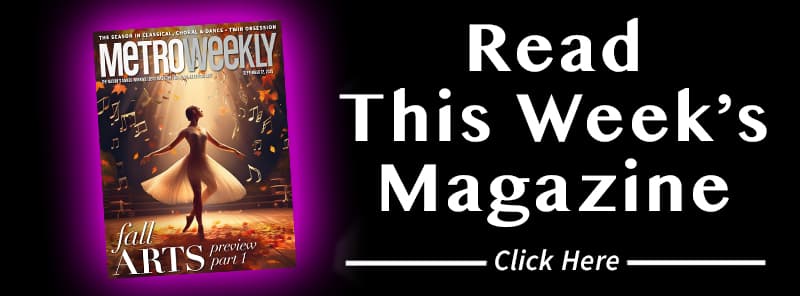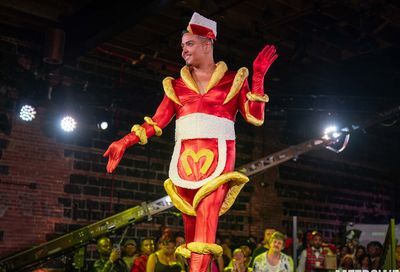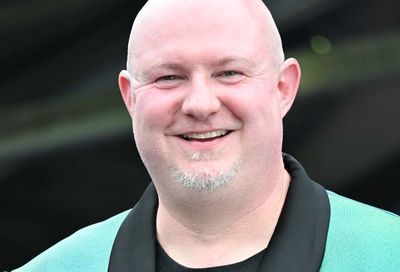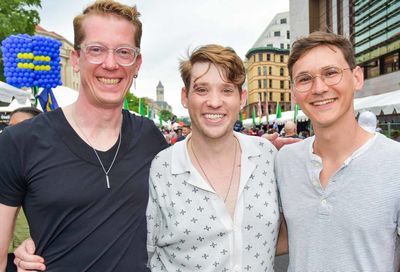Out and Proud
James Hawkins gets ready for D.C. Black Gay Pride
James W. Hawkins likes to get things organized the way they should be.
Take, for instance, his middle name.
”My mother named me ‘Westley,’ after my grandfather. I didn’t like the way it looked,” he laughs. ”So I adjusted it, and now it’s ‘Wesley.”’
At 42, Hawkins has taken up a far more daunting organizational effort as president of D.C. Black Pride, the organization behind the annual Memorial Day celebration of the black gay and lesbian community. A long weekend full of events, D.C. Black Pride kicked off on Wednesday, May 23, with an interfaith service and climaxes with the Black Pride Expo on Sunday, May 27, at the Washington Convention Center, where R&B sensation Monica will entertain the crowds.
 James Hawkins |
In between is a wide slate of activities including social, cultural and informational. It’s a full-schedule approach that Hawkins and the D.C. Black Pride board of directors hope to extend, building a year-long presence that focuses more directly on the D.C.-area community.
But for now, the Washington born and raised Hawkins is looking forward to the annual weekend celebration, which he sees as an event that will long have meaning for the community.
”I think part of the reason why there will be a D.C. Black Pride for a few more years is that people in the African-American community have latched onto and enjoyed having our own event,” he says. ”It’s not that we don’t attend or participate in Capital Pride. It’s just having our own individualized event that we put together that represents us 100 percent.”
METRO WEEKLY: You’ve been working with D.C. Black Pride for seven years, including the time before you began serving as president of the board. What’s kept you active in the organization for so long?
JAMES HAWKINS: My mother. I credit her with instilling in me a sense of community and giving back. I grew up here in Washington, D.C., in the inner city where we basically were not a middle class family — we were a poor family. We benefited from the charity of others, such as Christmas baskets, donations of toys and things of that nature. Even though we received those things, she always taught us that we had a responsibility to give back. That’s what kept me in it, my desire to uplift the little man and make things better.
MW: What are your goals for D.C. Black Pride weekend?
HAWKINS: Bringing the event back to the people of Washington. What I’ve heard from a lot of native Washingtonians and people who reside here in the Washington area, is that they will leave the city for that weekend because they feel that the event is not for them anymore. It’s an event for outsiders, it’s an event for people to come to town and just party and have a good time.
We want to do things that include as many people in Washington as we possibly can to show them that this is their Pride. This is their city and they should be here to showcase Washington as well as represent and be proud of what D.C. Black Pride has done in terms of pulling together the programming.
MW: In your own experience, did you see some validity in that complaint that the event was too focused on out-of-towners?
HAWKINS: Well, I think it was a reality. D.C. Black Pride basically was only doing events during Memorial Day weekend. The change that I’ve put into motion with the organization is that we will have a presence all year long with events where we’re partnering with community-based organizations, promoters and others to bring the folks who live here back into the fold. We want them to become more involved in the planning and the organization itself.
MW: Black Pride weekend really is a draw for people from across the country. I’m assuming you don’t want to lose that draw, even if you’re trying to focus more locally.
HAWKINS: We don’t want to lose that. D.C. Black Pride started out, for lack of a better word, as a circuit party. On Memorial Day Weekend everybody flocked to D.C. to party, have a good time, to enjoy themselves. When the AIDS epidemic hit, we had these three gentlemen — Wellmore Cook, Theodore Kirkland and Ernest Hopkins — who saw a need for providing activities and things during Memorial Day Weekend for people visiting, but they also saw a need for raising funds for HIV and AIDS organizations. That’s one of the things that this organization has as its primary mission. We’re making a concerted effort to get back to donating and giving more of our funds back to AIDS organizations.
MW: I know that that’s been a goal for the past couple of years. Do you feel that the organization is meeting that goal?
HAWKINS: This year we have selected four organizations to receive funds from D.C. Black Pride — SMYAL, the Youth Pride Alliance, Different Avenues and Transgender Health Empowerment. We’ve earmarked a total of $10,000 to be divided between those organizations. Our goal is to be able to donate more but we have at least made sure that we put aside $10,000 in order to make a contribution.
MW: How did you choose who you were going to support?
HAWKINS: It was a decision that was made by the board. We wanted to focus on those smaller to mid-size organizations such as Youth Pride Alliance and SMYAL, that do great work with youth. One of the things we want to make sure of is that the next generation of leaders is well prepared and have a safe place to go.
MW: Last year, after a number of years, the Black Pride Festival moved back outdoors for the first time in a number of years. This year, it’s back inside at the Washington Convention Center. Why the move back inside?
HAWKINS: Actually last year the primary reason that the event went outside was that a large conference had booked every room in the Washington Convention Center for that weekend. We pretty much knew that we weren’t going to be able to host the event indoors. It was kind of a fun thing to take it back outdoors and have that experience again.
I don’t want to get into numbers too much, but we actually lost money by having it outdoors. Attendance was down at the Festival. We generally average about 6,000 to 7,000 people, and we had about 4,000 people on that lot [on the old Convention Center site downtown] and about another 1,200 or 1,300 along the walkway sort of looking into the fence area enjoying the festivities and the show without actually paying admission to get in.
MW: Do you feel pretty confident that attendance will go back up?
HAWKINS: I feel confident that we should have a pretty solid attendance. I have a magical number in my mind of about 7,500 at the Festival on Sunday. We have a diverse group of vendors and an excellent lineup of entertainment, so I think we’re going to have a good show this year.
MW: I know that it’s a joint effort by lots of people but from your position, but what’s the one thing when you look at what’s coming up for this particular weekend, that you would point to and say, ”I’m proud of this”?
HAWKINS: There are two things. There’s the first-ever D.C. Black Pride Youth Forum where we’re providing a safe space for youth between the ages of 16 and 24 and talk about self image, talk about HIV and AIDS prevention, or ask questions about something as simple as ”I’m struggling with whether or not to go to college.” We’ll have representatives from SMYAL and Metro TeenAIDS there to help facilitate the conversations and answer some of those questions.
The other thing is the D.C. Idol Competition. We first did that in 2005, and we’re bringing it back. Anybody who feels they have talent can sign up — you’ve got 30 seconds to impress the judges to see if you make it to the next round. We have a lot of interesting people in our community and it’s going to be fun to sit there and let them come up and express themselves. We’re going to whittle it down to the top five, who will be part of the Expo’s entertainment. As judges, we have Doug Spearman, Frenchie Davis — a former American Idol — and D.C.’s own Shaquita Lee.
MW: There was just a news report that the African-American population in D.C. is decreasing, and likely won’t be a majority in the near future. As someone who grew up here, how did that make you feel when you saw the news?
HAWKINS: It makes me realize I need to move my behind back into the city. [Laughs.] I think it’s just part of the city’s growth. All things change — demographics change in terms of income and racial makeup. But I think that at some point you’ll see that it will level off and we’ll have a good mix of all people representing Washington.
As an adult, I’ve pretty much tried to live in communities that are diverse because I enjoy that diversity. I enjoy learning from my friends who are of Jewish descent or my friends of Latino descent or someone who is Buddhist or Indian or Asian. I think we can all learn from each other if we just have a conversation — if we just sit down over coffee or a piece of cake and just talk to one another and realize that there is no real difference between us other than our skin color and our ethnic makeup.
MW: Earlier, you mentioned your mother and how much influence she had over you. When did you come out to her and your family?
HAWKINS: I have four brothers and four sisters. My oldest sister actually came out as a lesbian in the ’70s. It was a difficult time for the family to deal with a different type of child. But with that, my sister sort of opened the door in terms of making things comfortable. Out of nine of us there are four of us who are gay. My brother, who is deceased, my two sisters and me. It made it easy for me to feel comfortable about who I am.
When I was 17, my mom asked me if I liked guys. And at that age, not totally comfortable yet with having that conversation with my mother, I was like, ”No, no, no, I have a girlfriend.” But she kind of picked up on things, by the time I came along. [Laughs.] She just came right out and asked me but I didn’t feel comfortable at that time answering that question. I struggled with it a little bit as any teenager would.
MW: Even with the examples in your family?
HAWKINS: My sister and my brothers were very positive role models for me, but growing up I felt this guilt about feeling attracted to men, knowing full well that the Bible says we’re not supposed to do this. It was just one of those things where I had to come to terms with the fact that God is going to love me no matter who I am and I have to accept that.
MW: Was church a big part of your upbringing?
HAWKINS: My mother sent us to church every Sunday. We were educated about the Bible but we were also taught to make our own informed decisions. In my family there were Jehovah’s Witnesses, Catholics, Episcopalians, Baptists — you were allowed to go out and determine your own path.
MW: What did yours end up being?
HAWKINS: I was actually baptized in the Baptist church. I finally came to the realization that I don’t need a structure in order to have a relationship with God. I can have a relationship with God without going to church every Sunday and I know, love and respect that there is a higher being that helped create me.
MW: What was it like being a teenager discovering your own sexuality in D.C.?
HAWKINS: It was fun, it was scary. My first experience with discovering gay culture was Dupont Circle — walking through there and seeing so many people comfortable with themselves and confident about themselves. I saw men who were comfortable being themselves and that let me know that I could be comfortable with who I was becoming.
It was great to be a kid here. Downtown was a fun place to be. It’s changed. When the Metro first opened we’d come downtown to do our holiday shopping or we’d go have tea at Garfinkle’s, which is now closed. It was just a fun place to be and explore. Again, when the subway opened up new doors and allowed us to venture beyond the neighborhood, it was a good place to be.
MW: Given all the changes, do you ever look around and say. ”This isn’t the same city”?
HAWKINS: I can go in certain parts of the city and see how things have changed for the better, the U Street corridor in particular. At one point in time, you wouldn’t want your cat walking down that street. Now it’s the place to visit. There are other areas of the city, such as areas over in Southeast Washington in the neighborhood I used to live in, that are being torn down and new town homes are being built there. So I see a lot of change for the good. But then there are other areas, such as east of the Anacostia, where there hasn’t been a significant amount of change.
MW: How do you feel about the relationship between the local straight black community and the local gay black community?
HAWKINS: It depends on who it is. You have some individuals in the heterosexual black community who are just very accepting and willing to understand beyond what they were taught, which is that if you were gay you’re going to hell. Then there are other individuals who are just going to continue to be what I consider close-minded they’re not going to open themselves up to realize that we’re your brothers, your sisters, your aunts, your uncles, your doctor, your pastor in some cases.
MW: Is it the case that some people are fine with ”gay” when it’s about white people, but when it’s about black people it’s a different issue?
HAWKINS: It goes back to if you’re a young black boy you’re not supposed to cry. There’s this whole thing with masculinity where you have to be a man, you have to be tough, you have to be strong. I’m 42, I’m a gay black man. I’m strong, I can cry if I need to cry, but I can be just as strong as any heterosexual man when it comes to dealing with any particular issue. So it’s just a matter of people really learning to understand that who we choose to be with on an intimate level is no different than what they’re doing.
MW: When you were young and exploring places like Dupont Circle, did it feel like it was a kind of separate, white community?
HAWKINS: I grew up basically seeing everything through rose-colored glasses where, yes, I see white people, I see Asians, I see Latinos, but I don’t look at their skin color first. I look at the content of their character and who they are. Yes, there were a lot of white gay men there but they didn’t treat me any differently and I didn’t treat them any differently. The conversations were interesting and they wanted to know about me, I had questions about them. So I didn’t look at things as just black and white, but rather as this is a person who I could potentially learn something from and maybe they could learn something from me.
MW: Do you think your experience was different from other people?
HAWKINS: I think it goes back to the individual person and what their belief systems are. As I said, I grew up in a household with nine different individuals, nine different personalities, and varying shades of blackness in my family. I have a sister who is extremely light-skinned and I have one who is dark-skinned. We were taught that there are differences in the world and those differences have to be respected and that shouldn’t deter you from getting to know who the individual is.
MW: When you’re not doing this, what do you do?
HAWKINS: I am an office and meeting planner for a non-profit research organization in D.C. so I basically organize and plan events.
MW: So you’re organizing events pretty much every moment that you’re awake?
HAWKINS: [Laughs.] Pretty much. My best friend, Eric, and I do an annual trip to the Outer Banks in North Carolina where we rent beach houses and 40 to 50 people come to stay. I cook, I organize, I plan games the entire time. It’s fun to sit and watch other people have a good time. I get my down time on these trips and I have fun, too, but I get a sense of accomplishment and satisfaction from ensuring that someone else is having a good time.
MW: Are you the type of person who has a dinner party and then has to be made to sit down and eat?
HAWKINS: Exactly. I’m making sure everybody else is having a good time. My mother was the light of my life and I think everything I do now I do because of the values she instilled in me and I want her to see that her little boy, who used to run in the back yard and pick all the wild flowers and bring them home to her, is continuing to give back and share whatever he has. People in the church always talked about giving 10 percent of their salary. I think the most important thing that most people can do is give 10 percent of themselves, be it to an organization, a child in need, or something else far more important than supporting a pastor’s Mercedes-Benz and large home. If folks want to do that, it’s fine. But I’d rather give directly back to those most in need.
D.C. Black Pride’s Liberty – Unity – Strength Festival will take place on Sunday, May 27, at the Washington Convention Center’s Hall C, 801 Mount Vernon Place NW, from noon to 6 p.m. Admission is $15. The Official Host Hotel for this year’s events is the Renaissance M Street Hotel, 1143 New Hampshire Avenue NW. For more information on the various events, see our community calendar on page 14, pick up a copy of the Official Black Pride Guide or read the Black Pride Guide online at www.metroweekly.com. For more information on D.C. Black Pride, visit www.dcblackpride.org.
Support Metro Weekly’s Journalism
These are challenging times for news organizations. And yet it’s crucial we stay active and provide vital resources and information to both our local readers and the world. So won’t you please take a moment and consider supporting Metro Weekly with a membership? For as little as $5 a month, you can help ensure Metro Weekly magazine and MetroWeekly.com remain free, viable resources as we provide the best, most diverse, culturally-resonant LGBTQ coverage in both the D.C. region and around the world. Memberships come with exclusive perks and discounts, your own personal digital delivery of each week’s magazine (and an archive), access to our Member's Lounge when it launches this fall, and exclusive members-only items like Metro Weekly Membership Mugs and Tote Bags! Check out all our membership levels here and please join us today!























